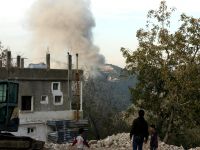Israeli Prime Minister Ehud Barak said Sunday there was a "golden opportunity" for peace with the Palestinians, a week before the start of a new round of talks to forge a comprehensive deal this year.
"I'm hopeful and optimistic that we will see highly intensive negotiations in the next few months," Barak said in a television interview, following a meeting with King Abdullah II, who was on his first official visit to the Jewish state since becoming Jordan's ruler 14 months ago.
"There is a golden opportunity with (Palestinian President Yasser) Arafat in power, with (US President Bill) Clinton still in power, with this government in Israel that wants to make peace."
Barak's remarks to CNN television followed his meeting in the Red Sea port of Eilat with King Abdullah, who spent only four hours in Israel after sailing in by yacht from the neighboring Jordanian port of Aqaba.
The Palestinians said they had called on Jordan to help advance the peace talks, which have failed to achieve any substantive progress on the key areas of conflict after the two most recent rounds of negotiations in the United States.
"We asked Jordan to get involved to help us get the withdrawal completed (from the occupied West Bank), to put an end to settlement activity, and to free prisoners of war and Palestinian detainees held in Israeli prisons," senior Palestinian negotiator Saeb Erakat said.
Erakat also said during a visit to Amman there would be a meeting soon between Arafat and King Abdullah, who on Sunday voiced hope for progress on both the Palestinian and Syrian peace fronts as well as for stronger ties with Israel.
"The Palestinian issue is a central one in the Arab-Israeli conflict and I am very hopeful that this year will witness a breakthrough that will give hope to the Palestinians in the justice they seek and to the Israeli people in the security that they desire," Abdullah said.
Asked if there had been changes on the Syrian track, where negotiations have been deadlocked since January, Barak told CNN: "Not something I can report.
"It's not closed, but there is a slight crack in the door. Everyone hopes, but no-one can guarantee that it can be opened."
The Syrian talks, which resumed amid great fanfare in December after a break of almost four years, stumbled over the fate of the Israeli-occupied Golan Heights, which Syria wants returned unconditionally as the price of peace.
Barak said the king's visit was a reminder of the "legacy of peace" left by the late King Hussein and he pledged to work with Jordan to ensure his vision becomes a reality.
Both leaders however pledged to build ties, although Israeli officials said an economic forum Sunday, expected to discuss plans for a joint airport and seaport on the Red Sea, was cancelled.
"History has shown us that in order for peace to strike deeper roots it is imperative that more and more people benefit from the dividends of peace and joint prosperity," Barak said.
King Abdullah II said on his arrival in Israel on Sunday that he hoped for a breakthrough in the Israeli-Palestinian peace process this year.
"The Palestinian issue is a central one in the Arab-Israeli conflict and I am very hopeful that this year will witness a breakthrough that will give hope to the Palestinians in the justice they seek and to the Israeli people in the security that they desire," he said shortly after his arrival in the Red Sea port of Eilat.
The king, who traveled on board his royal yacht, was welcomed at an official ceremony by Israeli Prime Minister Ehud Barak at an Israeli naval base in the Red Sea port of Eilat before a series of working meetings.
"They will exchange views (about the peace process)," Barak's security advisor Danny Yatom told AFP earlier.
"It (the visit) is very important. It is part of the normal relations between Jordan and Israel," he added.
The trip comes a week before a new session of peace talks between Israeli and Palestinian negotiators to be held in Eilat after two rounds in the United States failed to bring any major breakthroughs.
The king initially planned to visit Israel in February but put off his trip because of massive Israeli retaliatory raids in Lebanon after a string of deadly Hizbollah attacks on Israeli soldiers, and the impasse in the Palestinian and Syrian tracks of the peace process.
BBC.Online said in an analysis Sunday the young monarch doesn't have the warm relationship with Israeli leaders that distinguished his father, the late King Hussein.
But he is committed to the Middle East peace process and closely following Israeli-Palestinian final status talks, which will directly affect Jordan.
The king's restraint has been appreciated by his people, according to BBC, that added Jordanian people feel they haven't benefited much from peace – (Several Sources)
v
© 2000 Al Bawaba (www.albawaba.com)







